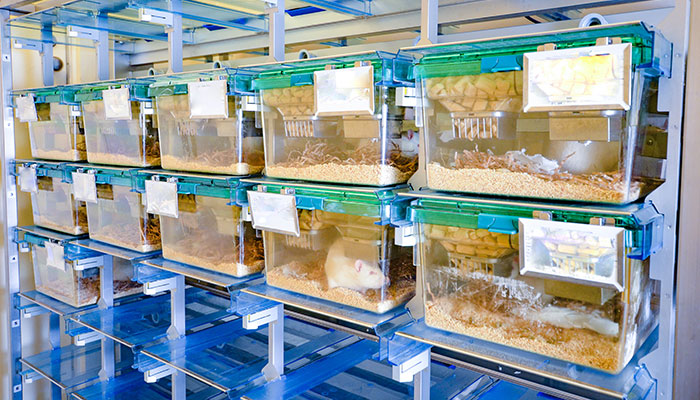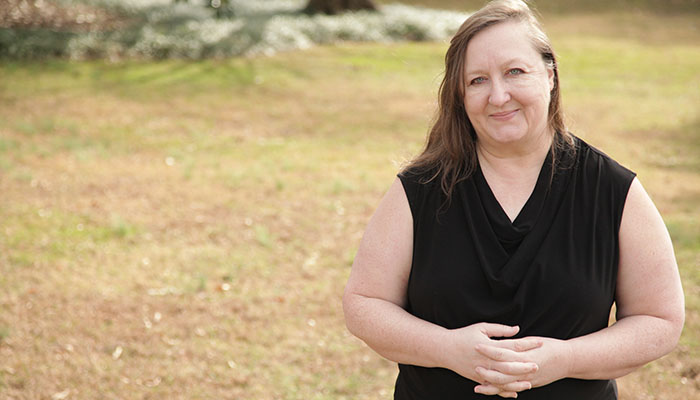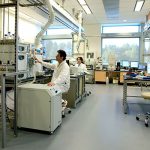COVID-19: Animal Care Operations for Teaching and Research
Last Updated 4/1/2020
Each of our 46 vivaria at UC Davis have facility specific continuity plans which will be activated as necessary. These procedures, along with capacities in our infrastructure, have been established as part of previous risk mitigation planning sessions in case of emergency situations. We are in contact with each of our vivaria at least weekly to ensure the animals and staff are doing well, and that they have all the necessary supplies to maintain excellent care for their animals.
We are still working with the understanding that the scientific integrity of ongoing studies can be maintained and that we will be able to provide the same level of husbandry care for all animals within our vivaria. We are not expecting, and have not been notified to expect, any potential disruption to our utilities or the ability of our infrastructure to safely care for and house our animals.
However, we have plans in place for emergencies including continued animal care with minimal staff. We have guidance from our regulatory groups on allowable flexibility of our standard operating procedures.
At this point, we know that non-human primates are susceptible to experimental infection with COVID-19. In response, the CNPRC has modified their facility access procedures. Additionally, we have stopped all non-employee traffic flow into all of our other primate areas.
According to the American Veterinary Medical Association, there have now been two dogs in Hong Kong and two cats (one in Hong Kong and one in Belgium) living with people that have been diagnosed with COVID-19 have been reported to have been infected with SARS-CoV-2. Additionally, there is now confirmation by USDA of a tiger from the Bronx Zoo in New York testing positive. The CDC has not received any reports of pets becoming sick with COVID-19 in the US. While information is changing continuously, at this point we are still not aware of transmission to our other research species.
Our primary concerns at this point are continuity of the daily care of our animals as well as continued availability of personal protective equipment, most specifically masks, that are used both for personnel and animal protection.
We can utilize cross-trained staff if needed to provide support in impacted areas should the situation arise. In some areas we have already instituted mask re-use programs. We will be expanding this program to additional facilities.
As of 3.18.20, the following will be implemented as a result of the campus moving to suspended operations. These changes will remain in place until campus operations status is updated:
- Moving forward, requests for animal orders and intra-campus transfers will be limited to ongoing research demands and will be evaluated on a case by case basis. Imports and exports are postponed until further notice.
- On-site breeding of research animals should be decreased significantly and we urge investigators to protect their critical lines by cryopreservation or other means.
- Research related activities need to be limited to those absolutely essential for ongoing studies or the heath of the animal. No new studies, with the exception of those that are specific to COVID-19, should be initiated.
- Daily husbandry practices are expected to continue per standard operating procedures although weekly and monthly duties may be delayed.
If you have any specific questions regarding your vivaria, we encourage you to reach out directly to your Scientist-in-Charge, your Technician-in-Charge, or to Laurie Brignolo ([email protected]) or Donna Routley ([email protected]) at the Animal Care Program.
Frequently Asked Questions
[symple_accordion][symple_accordion_section title=”Q: Is the IACUC still meeting and reviewing protocols and amendments?”] Yes. The IACUC Office staff are working remotely and IACUC meetings are occurring, as scheduled, via ZOOM. [/symple_accordion_section][symple_accordion_section title=”Q: Can I get expedited review for my new amendment or protocol?”] A: Amendments or protocols involving COVID-19 research or addressing a current animal welfare issue will be prioritized. Please work with the IACUC Office Specialist who is handling your protocol or amendment to address timelines for all other requests.[/symple_accordion_section][symple_accordion_section title=”Q: During suspended operations, will there still be animal care?”] A: Weekly and monthly duties may be delayed but daily husbandry will continue per Standard Operating Procedure (SOP).[/symple_accordion_section][symple_accordion_section title=”Q: Will I still be able to place orders for animals?”] A: During suspended operations, animal orders will be limited to on-going research demand and evaluated on a case-by-case basis.[/symple_accordion_section][symple_accordion_section title=”Q Will I still be able to request animal transfers through ATS?”] A: Transfers will be limited to on-going research demand and evaluated on a case-by-case basis.[/symple_accordion_section][symple_accordion_section title=”Q: I’d like to import/export animals to/from another institution, can I still do this?”] A: At this time, all imports and exports are postponed.[/symple_accordion_section][symple_accordion_section title=”Q: I have a new research study that I want to get started. Can I start it now?”] A: Research related activities should be limited to those essential for ongoing studies and for the health of the animals. No new studies should be initiated. Exceptions may be requested for studies focused on mitigating COVID-19.[/symple_accordion_section][symple_accordion_section title=”Q: During suspended operations, my breeding will be reduced, what can I do to protect my research?”] A: Investigators are strongly encouraged to protect critical lines by cryopreservation or other means.[/symple_accordion_section][/symple_accordion]







